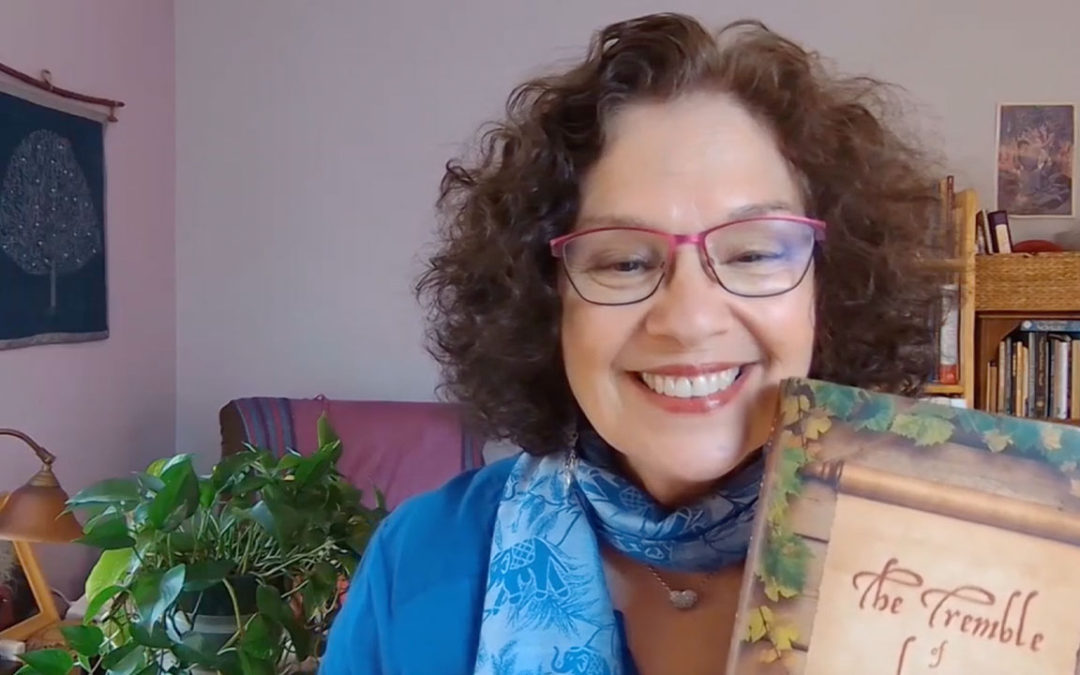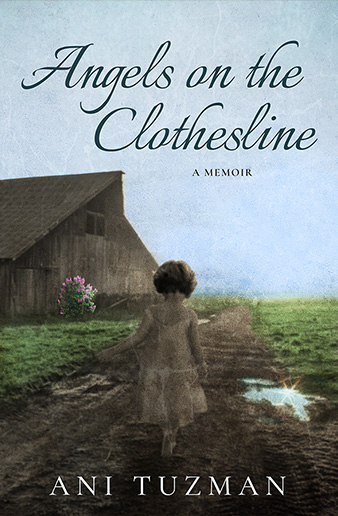Set in the 1700s in what is now western Ukraine, The Tremble of Love, A Novel of the Baal Shem Tov features a number of powerful and inspiring women.
Honoring women and children was among the blessings that the Baal Shem Tov brought to his time and to all time.
I am grateful for the opportunity to read to you again. This is my sixth reading. Each stands alone. You can find links to the previous short readings below or simply go to HARVESTING LOVE to find previous posts.
I recorded the following reading several weeks ago, but decided not to share it then. I was not sure if or when I would share it. Then earlier this week, news broke that the United States Supreme Court is likely to overturn the constitutional protection of women’s reproductive rights.
And, I realized I would be sending the next recording out on Mother’s Day!
Suddenly, this reading from The Tremble of Love seemed the perfect one to share.
Some context for this passage: Word of Yisroel’s healings and other controversial practices have begun to attract visitors to the remote inn where he lives with his family in the Carpathian Mountains. This scene unfolds through the eyes of Yisroel’s daughter Dalia, who calls her father by the affectionate “abba.” Yisroel is in his 30s; Dalia, about 12. (The full passage can be found starting on page 313 in the book.)
Below the video and audio recordings, you can find the text of the passage read in the video.
Audio only:
Note: The reading and its text shared below have been slightly edited to make them shorter. The last paragraph below is not included in the video reading.
After the Havdalah ceremony concluding the Sabbath, Dalia watched a somber youth of perhaps sixteen approach her father, who was kneeling at the hearth. The young man had traveled a long distance alone, she knew, arriving shortly before the descent of Sabbath.
The youth, waiting for her abba to stand, stood stiffly, shoulders back and chest expanded, as if his body were saying I dare you, even before a word had crossed his lips. He scowled as he addressed her father.
“I was warned of your behavior before traveling here. But only now, after praying under your roof, do I see how completely you abandon all caution concerning women and the dangers they pose.” The irate guest went on to quote a rabbinical commentary concerning distraction during prayer. Dalia looked at her father, who stood now facing the youth. He was smiling.
How could her father not feel even a trace of annoyance, she wondered. Even she felt annoyed. It astounded Dalia that her abba never responded in the manner in which he was attacked. In the face of defiance, hostility, and now, youthful arrogance, he only smiled and otherwise acted completely unassailed. How gracefully did he step out of the path of an arrow, leaving it with no target!
The young man took a deep breath. Keeping his gaze directed to the floor, he turned in Dalia’s direction. Without waiting for her father to signal her to stay or leave, she slipped behind the muslin divider that had been moved to the side of the room. She heard the boy draw a long breath and then continue speaking.
“My father, a rabbi of great renown, has impressed on me since I was a small boy how carefully I must protect myself from the evils of women, including my mother and sisters. You have allowed women to invade the hallowed sanctuary of men’s prayer. How can you permit this?”
When her abba still made no comment, despite the gravity of the violation being pointed out to him, the agitated young man continued more vehemently, raising his voice.
“My esteemed father was right about you. What you are condoning prevents a man from offering himself fully to his prayer. To hear the voices of women joined with ours makes it impossible to shun images of other kinds of joining with them. Women steal the minds of men away from the divine mandate to focus on holy texts and perform other sacred duties.”
When Yisroel still did not respond, Dalia pictured the silence shattering into shards like a fragile cup unable to contain its contents.
She heard Yisroel draw in a deep breath and she did the same. But, despite pausing and breathing deeply, Dalia felt her anger growing. This belligerent boy’s “esteemed” father had apparently taught him little or nothing about speaking respectfully.
“My father, the honorable Rabbi Mendel, is the head of one of Brody’s yeshivas,” he went on. He teaches the importance of dominating one’s thoughts regarding the female gender and cautions us to dominate our wives when we marry lest their powers of seduction deter—or, worse, destroy—our passion for study. Rabbi Mendel warns of the countless ways women so cunningly arouse men’s passion and lead them astray.”
“What is your name, my son?” Yisroel interrupted, his voice steady and calm.
“Amos, son of Mendel,” he answered, as if his father’s name were a shield protecting him.
“Are you married, Reb Amos?”
“No …” he stammered, “but soon to be.”
“So you are betrothed?”
“I will be soon.”
“What is your basherte’s, your destined one’s, name?”
Dalia could hear a tremor in the student’s voice as he replied, “I do not know. My father will choose, not I.”
“Reb Amos, it is natural for one’s mind to wander towards union with one’s beloved. The pleasure that God has ordained between a man and his beloved is not sinful but holy. You are right that thoughts of such union may distract a man or a woman reciting words of prayer. But this can be an opportunity, Reb Amos. We can feel grateful for the pleasures available to us, then offer our gratitude and sing God’s praises with even more ardor.” […]
Dalia wished she could see the face of Amos ben Mendel as her father spoke. She thought she heard the young man sigh, but not one of his earlier sighs of disgust. Had he become able to listen?
“Women are not to be dominated by men, my son. On the contrary, we men have much to learn from women. Because a woman is a vessel for life, she is more capable of surrender, and her heart is more readily stirred to compassion and tenderness. To dominate women is to destroy the tenderness that seeks to take root within us as men. It is true that women may seduce us, but this can be a holy seduction: women beckon us into our hearts.”
Dalia risked peering over the top of the divider. The youth’s taut neck muscles had loosened. Amos said nothing, and lowered himself into a chair. At least for now he had stopped fighting.
“Do not wage war against your instincts, my son,” her father’s voice consoled. “It is not women who threaten harm. The deadly serpent is your fear of women, not women themselves.”
Pain flashed across Amos’ face.
Dalia wondered if this was “breaking the shell of his pain,” as Yisroel described it. Breaking open, her father often said, did not happen through force, but through love. Such opening, although it might appear to be against a person’s will, was always aligned with that person’s deeper longing. With his shell broken, Dalia thought, perhaps the tenderness hidden within Amos could be expressed, and the tenderness of others like her abba, and even women, might be allowed to enter his life.
__________________________________________________________________________
“The message of the Baal Shem Tov―ecstatic seeker, compassionate healer, mediator, mystical teacher, and peacemaker―is as needed today as it was in his lifetime: our capacity to love and care for the other is the path to lasting peace and harmony..”
~Paula Green, founder and senior adviser of Karuna Center for Peacebuilding
If you missed my previous four readings, you can find them here:
Listen to Preface and Author’s Note Read by Ani
Ani Reads Opening to Chapter One
The Power of Compassion
A Daughter’s Hunger to Learn
Our Grief is Our Love
If you have not yet read The Tremble of Love, learn more here. You can find information about where to get hardcover, paperback, eBook or audiobook editions here
And for those who have already read The Tremble of Love, A Novel of the Baal Shem Tov, or are rereading the novel now, please consider rating and leaving a review, which can be just a few words, on Amazon (even if you got the book elsewhere) and/or Goodreads. Reviews help the book and its message of love reach more souls!
May we know and be the power of Love.
Ani
G'Mar Chatima Tova
I close with this customary greeting whose literal meaning is: "a good final sealing." I will add to that: May you know the love of which you are made. What better than to know this?
With gratitude,
Ani
Your comments make this blog a conversation!
I would love to hear from you.
To avoid spam all comments are moderated by Ani. So if you don’t see your comment show up, not to worry; your comment will be up within within 24-48 hours






Thank you Ani, What a wonderful reading. It is so timely and how easily lost the rights of women. I can feel the anger and meanness sweeping across the land as old men try to oppress women once again.